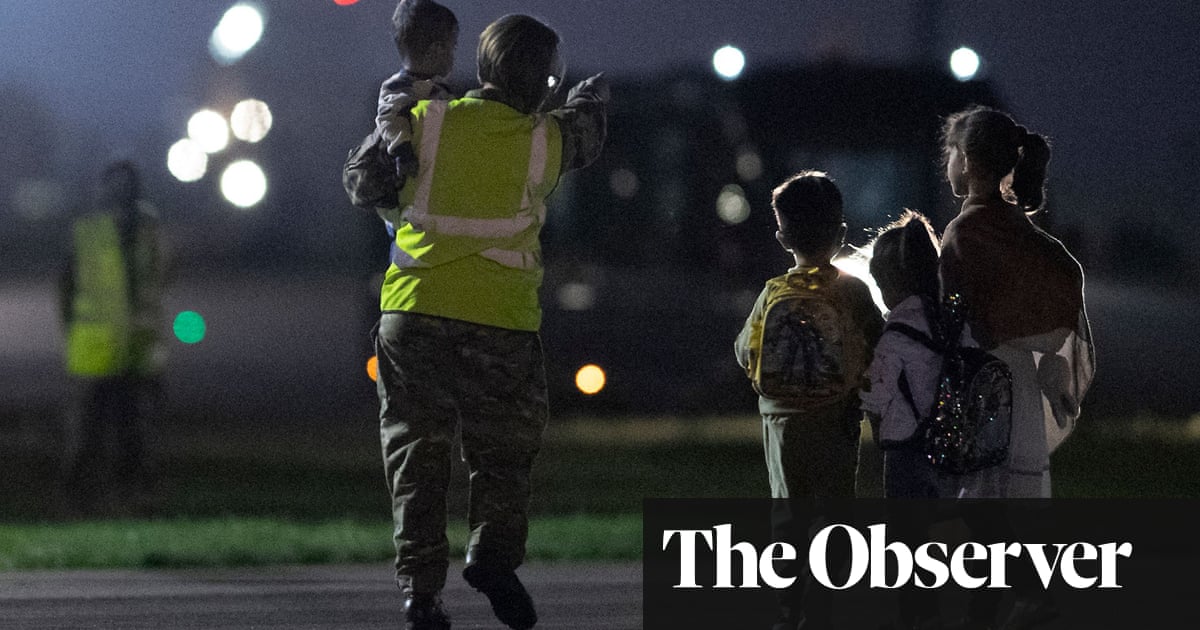
Thousands of Afghan refugees in the UK face homelessness this summer, the government was warned last week at a secret crisis meeting in Downing Street.
Council officials told No 10 and Home Office civil servants that about 8,000 Afghan refugees, allowed into the country in 2021 under the slogan Operation Warm Welcome, are due to be evicted from hotels as early as August because of a government deadline, yet have nowhere to go.
The emergency meeting, held last Thursday, came hours before the prime minister quietly dropped a controversial plank of last year’s asylum law that had introduced a two-tier refugee system.
Further problems for Rishi Sunak arrive on Sunday when a parliamentary committee will say his illegal migration bill breaches a number of international human rights obligations and would mean that the UK is “turning its back on the vast majority of refugees”.
In a damning report, the joint committee on human rights urges the UK to fulfil its role in the global system of refugee protection and not walk away from its legal obligations to refugees, children and victims of modern slavery.
During Thursday’s meeting, also attended by a number of Home Office private contractors, officials discussed “low-cost” options to move up to 50,000 asylum seekers who are in hotel accommodation. However, it became “quickly evident” that councils would struggle to help because of an acute housing shortage.
Pressure on the system is likely to grow further as the number of small boat crossings increases with improved weather conditions.
To reduce numbers of asylum seekers staying in hotels – which reportedly costs £6m a day – Sunak confirmed last Monday that the government had acquired two more giant barges to house about 1,000 people.
The purchase has raised fresh questions over value for money. The Observer can reveal that the Home Office paid contractor Serco at least £1.5m to turn a “substandard” former military base into an asylum-seeker reception centre that was never used.
MPs and councillors accused ministers of wasting taxpayers’ money after the failed attempt to convert RAF Linton-on-Ouse in North Yorkshire, and said the sum, disclosed to the Observer and Liberty Investigates after a year-long freedom of information battle, could be just a fraction of the true amount spent. The bid to accommodate up to 1,500 asylum seekers at the base in April 2022 was scrapped less than four months later following fierce opposition and threats of legal action from the local council.
Marc Goddard, Linton-on-Ouse parish council chairman, who campaigned against the plans, said the “wasted” cash was “another terrible consequence of what a shambles the whole government and the Home Office, in particular, are.”
The freedom of information response revealed the Home Office paid Serco £1,490,812 for services “largely comprising staff costs (including recruitment, training and salaries), mobilisation, project management, ground maintenance, inventory, telephony and vehicles.”
As problems continue to pile up for the government, the lack of suitable places to house asylum seekers could, say experts, threaten the viability of its illegal migration bill.
The legislation would grant ministers the power to detain and remove anyone arriving in the UK illegally. Analysis by the Refugee Council indicates that more than 190,000 people could be locked up or forced into destitution during the first three years of implementation of the bill. But with capacity already far exceeded, it remains unclear where such huge numbers could be held.
The report by the joint committee on human rights warns that if the bill is passed in its current form, the UK would fail to meet its obligations under international human rights law. These failures would include denying refugees access to the asylum system and severely restricting human rights claims, denying protection to modern slavery victims, and removing the right of appeal after age assessments.
Committee chair Joanna Cherry queried a claim by home secretary Suella Braverman that the bill was compatible with international law. Cherry said: “We disagree. Having carried out scrutiny of the bill it is overwhelmingly clear that it breaches a number of the UK’s international human rights obligations.”
She also questioned its impact on children seeking sanctuary in the UK.
“The bill falls far short on providing the protection children need and deserve. If this bill is passed it is likely to have a disproportionate impact on vulnerable groups.”
The Home Office said: “The government is committed to ending the expensive use of hotels for asylum seekers which is why we continue to source new alternative sites and vessels, which are cheaper and more manageable for communities.
“The asylum system currently costs more than £3bn a year so taxpayers rightly expect the government to find alternative solutions.”
It added: “We are also taking immediate action to clear the asylum backlog by doubling the number of asylum caseworkers to 2,500 and streamlining interviews and paperwork.”
The Linton-on-Ouse disclosure also does not appear to include any payout that may have been agreed for early termination of the Home Office’s two-year contract with Serco, which would have seen it earn £32.8m. Both the Home Office and Serco said they would not comment on the costs.
Downing Street and the Home Office were approached for comment on last week’s meeting.












